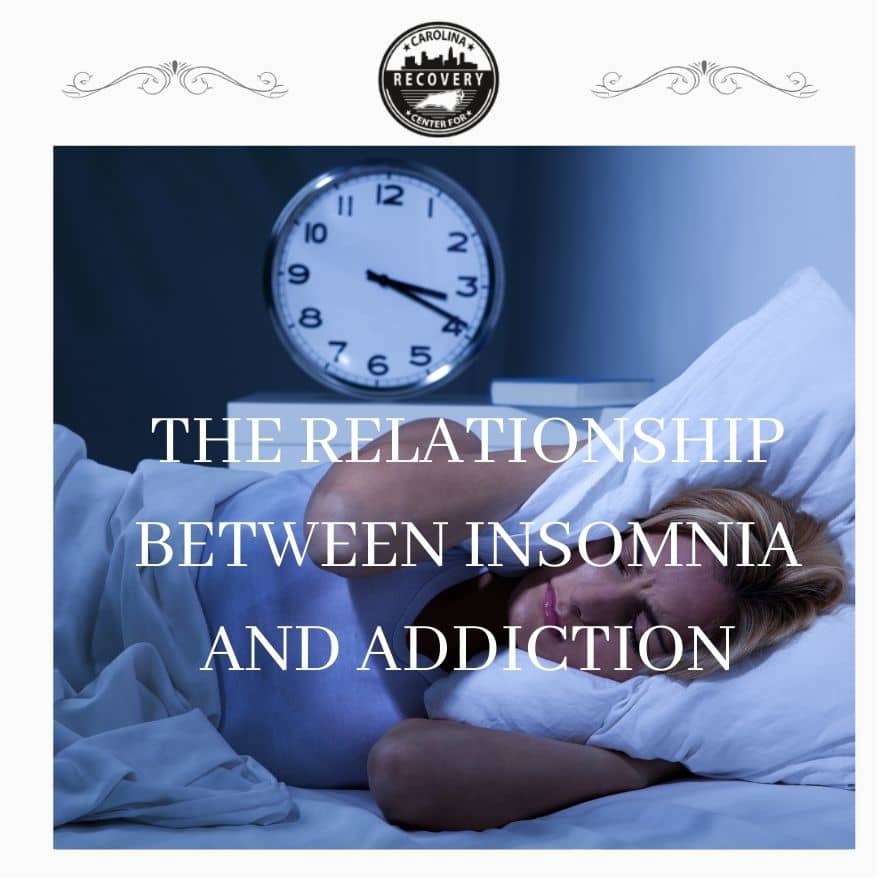The Relationship Between Insomnia and Addiction

Medically Verified: 2/1/24
Medical Reviewer
Chief Editor

All of the information on this page has been reviewed and verified by a certified addiction professional.
When you have an addiction to drugs or alcohol, there is likely something else going on as well. According to the National Institute of Drug Abuse, of the 20.3 million adults who suffer from a substance use disorder, nearly 40% of them have a co-occurring mental health condition.[1]
While depression, anxiety, and post-traumatic stress disorder are some of the most common conditions connected to addiction, sleep disorders are prevalent among addicts as well.
According to a study published by Frontiers in Psychiatry, insomnia is the most common sleep disorder, affecting between 20 to 35% of the general population. This study also found that insomnia affects people with substance use disorders at a higher rate, affecting up to 85% of these individuals.[2]
Because insomnia commonly co-occurs with addiction, you must understand how these disorders can develop and interact with one another. Being aware of this information can help you find appropriate and effective treatment methods.
What is Insomnia?
Insomnia is a common sleep disorder that can make it difficult for you to fall asleep or stay asleep. When you struggle with this condition, you will likely still feel tired when you wake up. Not only can insomnia drain your energy levels, but it can also affect your mood, overall health, performance at work, and quality of life.
Many people experience periods of insomnia throughout their life. This could include not getting enough sleep for a few days or weeks and is often the result of stress or experiencing a traumatic event. This is known as short-term or acute insomnia.
However, you could develop chronic insomnia which can last for a month or more. While insomnia can be the primary issue, oftentimes it is caused by other factors such as certain medical conditions or medications that you are taking.
The symptoms of insomnia include:
- Difficulty falling asleep at night
- Waking up throughout the night
- Waking up too early and not being able to fall back asleep
- Not feeling well-rested after a night’s sleep
- Daytime tiredness
- Irritability, depression, and anxiety
- Having a hard time paying attention, focusing, or remembering
- Increased errors or accidents
- Ongoing worries about sleep
Insomnia is a mental health condition that is treatable through medications and therapy. If you struggle with insomnia, you should consult with a medical professional to talk about the next steps. Missing sleep consistently can take a toll on your physical and mental health, diminishing your overall quality of life.
How are Addiction and Insomnia Connected?
Insomnia can be caused by a variety of outside factors. Sometimes it stems from other mental health issues, disruptions in hormones, and even medical conditions like chronic pain.
However, insomnia can also be caused by substance abuse, depending on the type of substance you are taking. People suffering from insomnia deal with mental health issues like depression and anxiety due to the lack of sleep they face. With that being said, your untreated insomnia could lead you to self-medicate with drugs or alcohol.
Insomnia as the Cause of Substance Abuse
Insomnia causes you to be unable to sleep or experience a full night’s rest. Over time, the lack of sleep will begin to affect your overall mood. Because of this, insomnia can cause you to experience symptoms of depression and anxiety – which can be difficult to deal with without the proper coping mechanisms.
When you are dealing with the effects of insomnia on your own, you may seek out ways to self-medicate your symptoms. This can lead to substance abuse and eventually, addiction. While certain substances like alcohol, opioids, marijuana, or benzodiazepines may help you sleep, taking them frequently could worsen your insomnia over time.
At the same time, many of the medications used to treat insomnia, such as benzodiazepines or sedatives like Ambien, can be addictive when abused.
Substance Abuse as the Cause of Insomnia
Insomnia can also be caused by frequent substance abuse. Continued use of alcohol or drugs will affect how your brain functions. This can disrupt your brain’s sleep-regulatory system, causing you to be unable to experience restful sleep.
Drug abuse increases the release of dopamine in your brain, which is responsible for producing feelings of pleasure, alertness, and your sleep-wake cycle. When you repeatedly use a drug, your dopamine levels will be affected, leading to increased alertness and sleep deprivation. Additionally, sleep deprivation can deplete your dopamine levels, causing your brain to crave the substances that have been causing rushes of dopamine.
Find Help for Co-Occurring Insomnia and Addiction
Suffering from comorbid insomnia and addiction can be difficult. Not getting enough sleep on top of experiencing the effects of a substance use disorder can significantly impact your quality of life for the worse. If you or a loved one are addicted to drugs and alcohol and experience insomnia, professional drug and alcohol rehab can help.
At Carolina Center for Recovery, we can help you overcome the disease of addiction and treat your insomnia, allowing you to live a happy and healthy life. Contact us today for more information on our co-occurring disorder treatment programs.
References:

